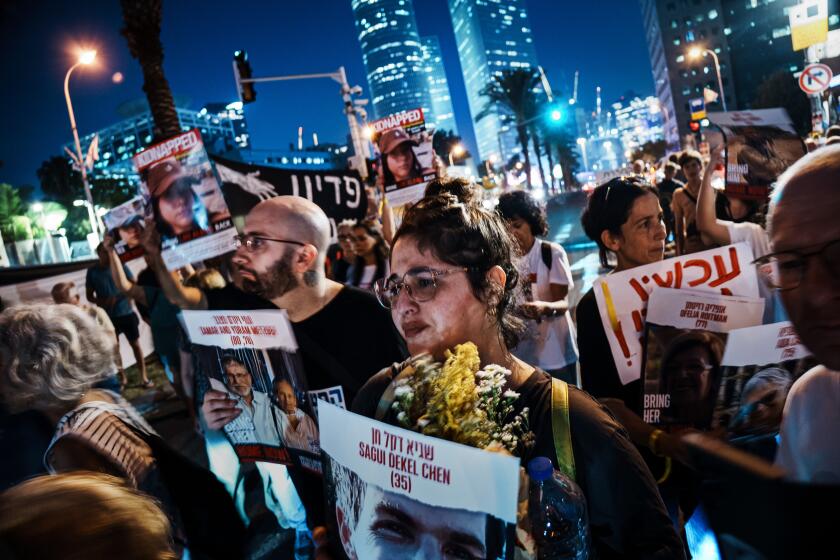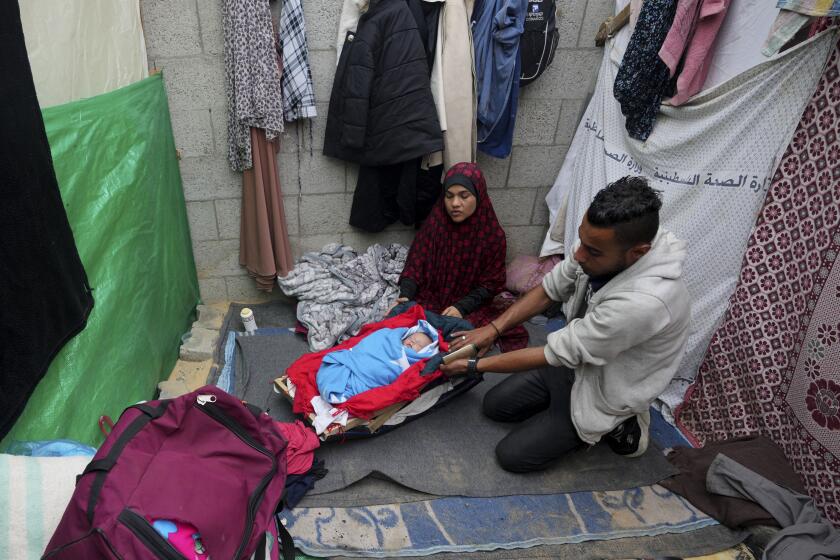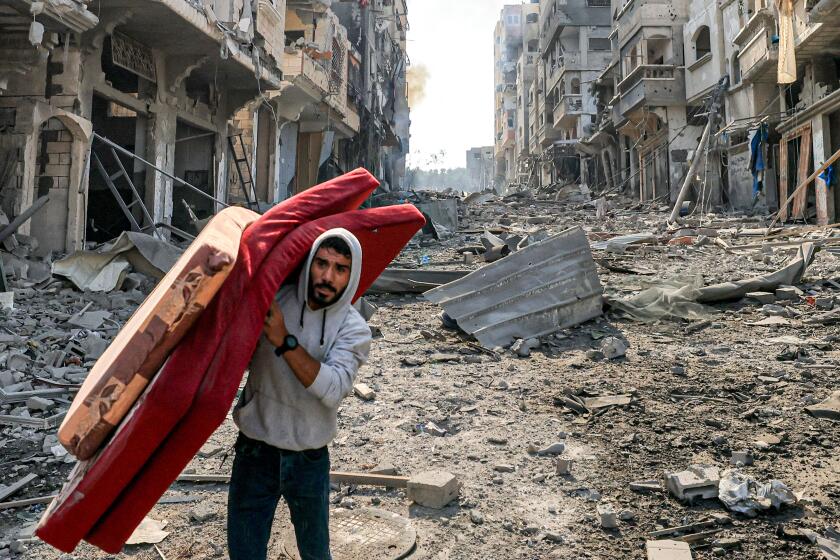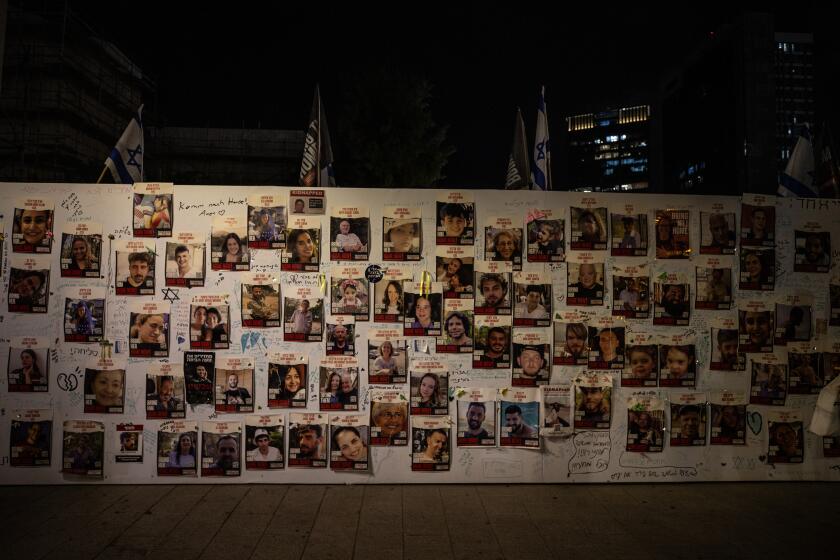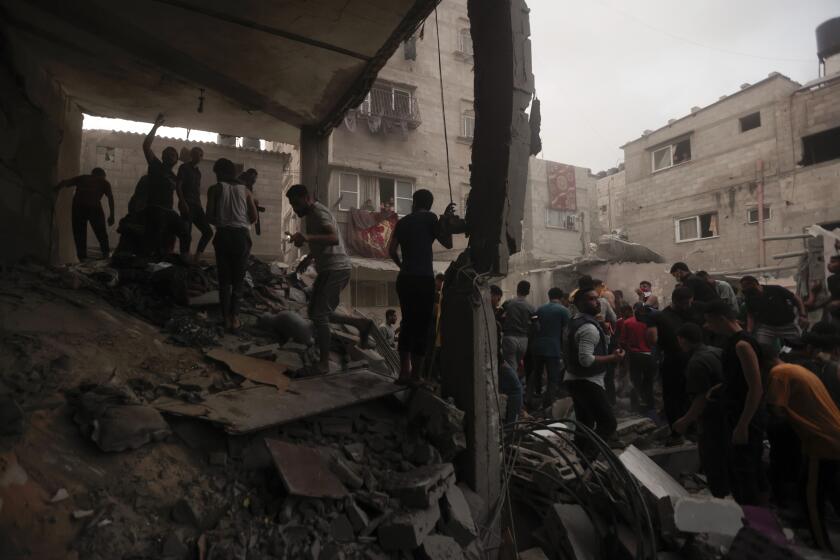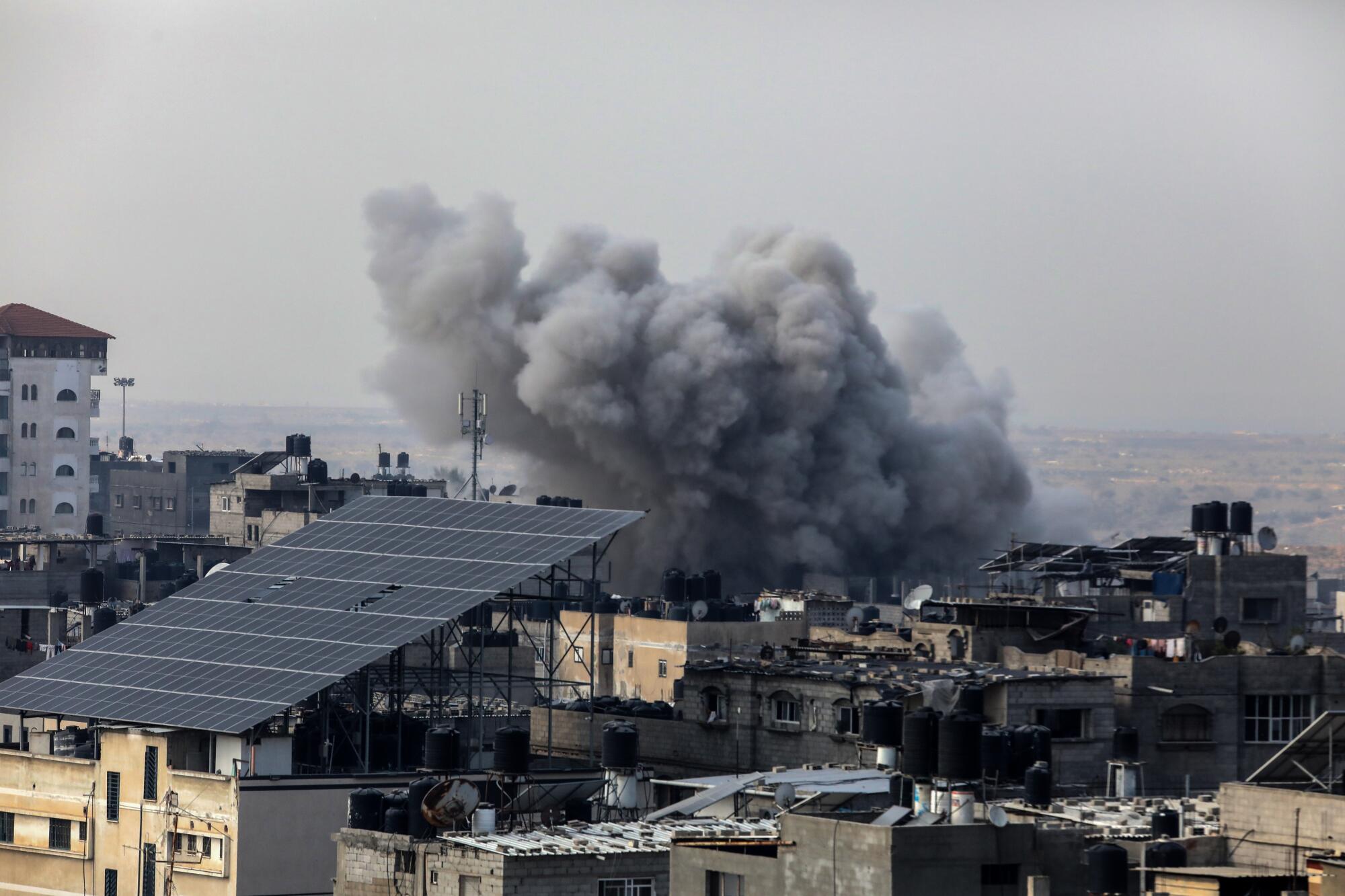
- Share via
Israel had broad support from the nations of the world after Hamas’ murderous Oct. 7 attack, its premeditated slaughter of innocent people and its unconscionable taking of civilian hostages. Accounts of sexual assault and horrors even more unspeakable help to explain the ferocity of the Israeli counterattack.
As President Biden has noted, though, Israel is now losing sympathy and global support due to its “indiscriminate bombing” and Prime Minister Benjamin Netanyahu’s rejection of any prospect of a future Palestinian state.
Israel’s quest to root out Hamas has inflicted indiscriminate death and destruction on Gaza and Palestinian civilians. Humanitarian pauses are no longer enough.
Hamas atrocities, no matter how evil, do not justify Israel’s casual conflation of legitimate militant targets and Palestinian civilians.
From the beginning of Israel’s response, governments and observers urged an end to the disproportionate civilian killings and warned of starvation and rampant spread of disease in the tiny, densely populated strip of land. They called then, and are properly calling now, for a cease-fire.
Early on, Netanyahu said there would be no let-up.
“Just as the United States would not agree to a cease-fire after the bombing of Pearl Harbor or the terrorist attack of 9/11,” he said on Oct. 30, “Israel will not agree to the cessation of hostilities with Hamas after the horrific attack of Oct. 7.”
Yet less than a month later, Israel agreed to a cease-fire — of sorts.
Israel-Hamas war: In a national vigil of sorts, Israelis hope for the return of more than 220 people seized by militants and believed held in Gaza.
The pause in military action that began Nov. 24 was set for four days, but talks mediated by Qatar resulted in two extensions. Hamas returned about 100 hostages and Israel released around 240 jailed Palestinians. Gaza civilians were given a respite for mourning their loved ones killed in the bombings and a chance to obtain water, food and medical supplies.
Hostilities resumed on Nov. 30. Since then, Israel’s bombing of Gaza has been — difficult as it is to fathom — even more brutal. Having warned Palestinian civilians to leave their homes in north Gaza, and then essentially destroying Gaza City, the Israeli military is now bringing the same destruction to the southern part of the strip. Several aid groups described the humanitarian situation in the territory as in “apocalyptic free fall.”
Heavy fighting across Gaza as Israel presses ahead with renewed U.S. military and diplomatic support
Heavy fighting is raging across Gaza, including in the devastated north as Israel moves ahead with renewed U.S. support
Horrified by the slaughter, most of the nations of the world have called for another, more-lasting cease-fire. The United Nations General Assembly adopted a resolution to that effect Tuesday, days after a Security Council vote was thwarted by a U.S. veto.
It’s important to remember that from the time Hamas won Gaza elections in 2006, it and Israel have been at war, punctuated by periodic truce, pause or cease-fire (the terminology matters little to civilians trying to live their lives and raise their children).
The current truce is an important step. But the U.S. government should join in global calls for a cease-fire in Gaza.
Full-scale fighting erupted in 2008, 2012, 2014 and 2021, then in each case largely abated. Each pause of a year, two years, seven years, brought not only periods relatively free from horror but also hope that cease-fires might be extended and just maybe lead to talks and a sustainable period free from cross-border attacks. Or even an accord paving the way to lasting peace.
The recent history of the Middle East consists of two urgent struggles. The obvious one pits Israel against Hamas, a terrorist organization, as each vows to annihilate the other and refers to its enemy in subhuman terms.
In Gaza conflict, words like ‘terrorism’ and ‘genocide’ are potent weapons. Definitions matter
Call a war crime a war crime, regardless of whether you support the perpetrator’s cause.
The second contest is even more existential. It’s between the human aspiration to seek peace, despite real provocations and long-standing grievances, and the baser instinct to exterminate the enemy once and for all, notwithstanding the cost to innocent lives and gross violation of international laws of war.
In this struggle, the United States should choose a path that might make peace in the future still possible. It should reverse its position against a cease-fire.
‘The world cannot stand by to witness more slaughter of civilians,’ says The Times’ editorial board, plus more from the week in Opinion.
Acknowledging its own mistakes in response to 9/11 — as President Biden noted at the start of the current war — the U.S. should use its stature as a powerful democracy and its loyalty to and support of Israel to demand another respite from horror. And then it should work to make that pause a lasting cessation of hostilities.
Israel, as a fellow industrialized democracy with state-of-the-art intelligence, technology and defense capability, has set high standards for its response to attack. It has in the past deployed precision operations, such as the 1976 Entebbe raid to free airline passengers held hostage in Uganda by Palestinian and German hijackers.
Israeli warplanes are striking parts of the Gaza Strip including some of the dwindling bits of land it told Palestinians to evacuate to in the south.
The current indiscriminate killing in Gaza, in which two-thirds of the dead are women and children, bears little resemblance to surgical strikes and reveals little apparent distinction by Israel between legitimate Hamas targets and innocent civilians.
Netanyahu’s comparison with 9/11 may be more apt than he realizes. After the al Qaeda attack, the U.S. enjoyed the world’s support against terrorism, then squandered it by its brutal tactics in the war. Today the Taliban again rule in Kabul. Al Qaeda is diminished, but Islamic extremism remains.
Even if Israel succeeds in destroying Hamas, Palestinian statelessness, hopelessness and dehumanization will persist and are likely to give rise to new hostilities. Hope for change in this seemingly intractable conflict can begin when wholesale killing ends.
More to Read
A cure for the common opinion
Get thought-provoking perspectives with our weekly newsletter.
You may occasionally receive promotional content from the Los Angeles Times.

